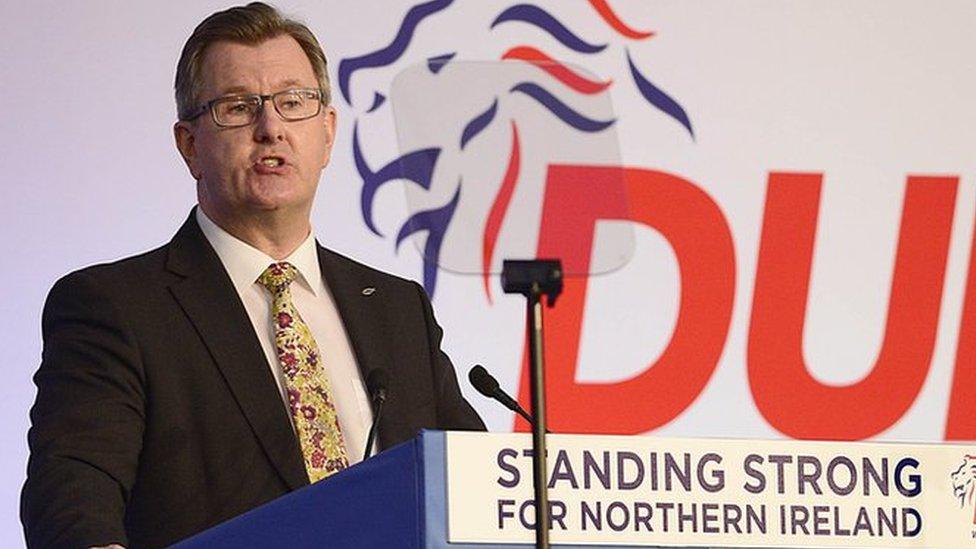Sir Jeffrey Donaldson: Who is the man set to be DUP's new leader?
- Published
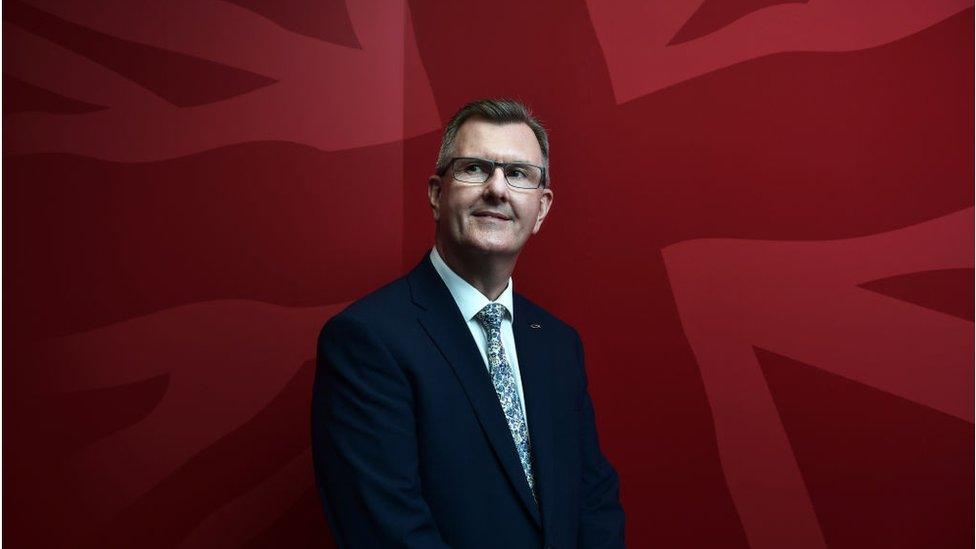
Launching his leadership campaign, Sir Jeffrey said he was convinced Northern Ireland's "best days are ahead"
Sir Jeffrey Donaldson's self-proclaimed interest in military history, external could be about to come in handy.
He may have conquered second time around in the fight to become the new party leader, but now the strategising really starts.
He will have to devise a battle plan for the next assembly election.
There is also the question of how he intends to unite his divided troops over the direction the party should take.
Even for an experienced politician whose rise through the ranks of unionism has been steady, it will be a tough task.
His decision to enlist in a life of politics was influenced initially not by power, but in protest against IRA violence.
Born in December 1962, the oldest of five boys and three girls, Jeffrey Donaldson was brought up in rural Kilkeel, County Down.
He described his own childhood as being "shattered" by the Troubles, most significantly by the murder of his cousin, Samuel Donaldson, a Royal Ulster Constabulary (RUC) officer.
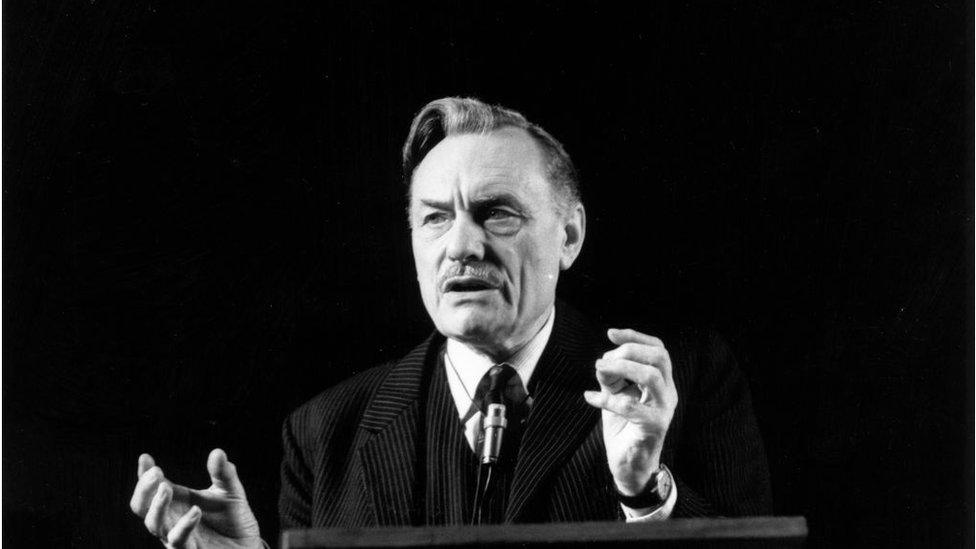
Sir Jeffrey worked for MP Enoch Powell between 1982 and 1984 after joining the Ulster Unionist Party (UUP)
He joined the Orange Order at the age of 16 and the Young Unionist movement soon afterwards, as well as joining the Ulster Defence Regiment (UDR).
He began working for MP Enoch Powell between 1982 and 1984 after joining the Ulster Unionist Party (UUP), later leading election campaigns for him.
His own career in frontline politics began in 1985 when he was elected to the Northern Ireland Assembly to represent the South Down constituency.
He entered the failed assembly as its youngest member and later became heavily involved in the unionist movement in the United States, often joining his party's delegations to visit President Bill Clinton in Washington.
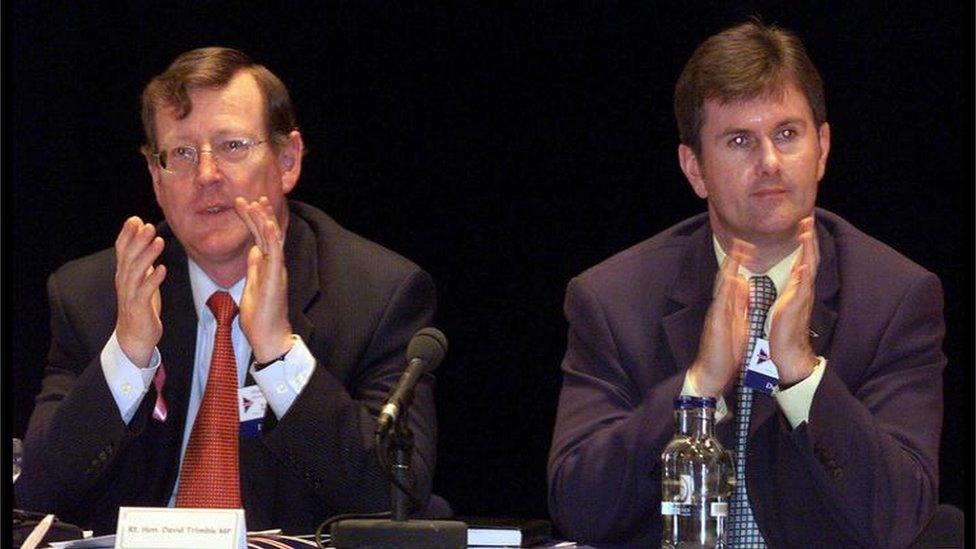
Jeffrey Donaldson was one of the UUP's biggest critics of the Good Friday Agreement, warning his leader David Trimble (left) against supporting it
In 1997, when his boss James Molyneaux retired as the Lagan Valley MP, Jeffrey Donaldson retained the seat comfortably for the Ulster Unionists.
But as political negotiations at Stormont moved towards the signing of the Good Friday peace agreement, his reputation as a man of protest remained.
He became one of the Ulster Unionist Party's biggest critics of the deal, warning his leader David Trimble against supporting it.
He, instead, argued there needed to be clear evidence of the IRA's decommissioning of weapons and disagreed on the reformation of the police, which would eventually see the RUC replaced by the Police Service of Northern Ireland (PSNI).
Although he remained part of the UUP's negotiating team, just as the deal was nearing completion, the MP staged a dramatic walkout from the talks.
He remained a thorn in the side of Mr Trimble long after the power-sharing executive was formed.
The anticipated leadership challenge never came, external, though the Lagan Valley MP repeatedly refused to get in line behind party policy and supported failed bids by others to oust Mr Trimble from office.
It was no surprise that he eventually quit the party in 2003, external, defecting to the DUP just a month later.
He was one of three ex-UUP members to make the move - also among that trio was Arlene Foster.
It seemed a perfect fit and he quickly rose through the DUP's chain of command, no longer a figure of protest but a key policymaker within the party.
Although in recent years he has been based at Westminster, he also served as an assembly member (MLA) at Stormont and as a Lisburn councillor for a time, though he stepped down from those two roles when the ban on double-jobbing was introduced.
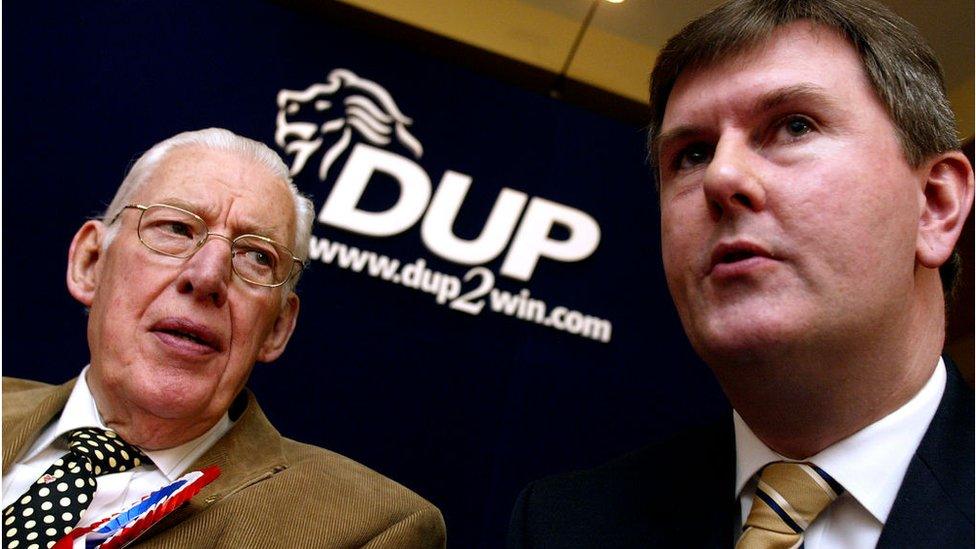
Sir Jeffrey Donaldson quit the UUP in 2003 before joining the DUP under Ian Paisley
In the 2009 expenses scandal he faced scrutiny along with many other MPs.
He later apologised for claiming back the cost of hotel pay-per-view films, external on his parliamentary expenses, repaying more than £660 to the Commons' fees office.
But his record otherwise has remained unblemished.
An ambitious politician, he became the DUP's spokesperson on defence issues in the Commons and the party's chief whip at Westminster in 2015.
The following year he became the first member of the DUP to receive a knighthood, as part of the Queen's 90th Birthday Honours list.
In June 2017, he found himself at the heart of a major negotiation as the DUP agreed a confidence-and-supply deal with the Conservative Party.
The votes of Sir Jeffrey and his nine DUP colleagues were crucial to keeping then-Prime Minister Theresa May in government, after she lost her parliamentary majority.
He later became heavily involved in talks with the government as it worked to reach a Brexit deal with the EU.
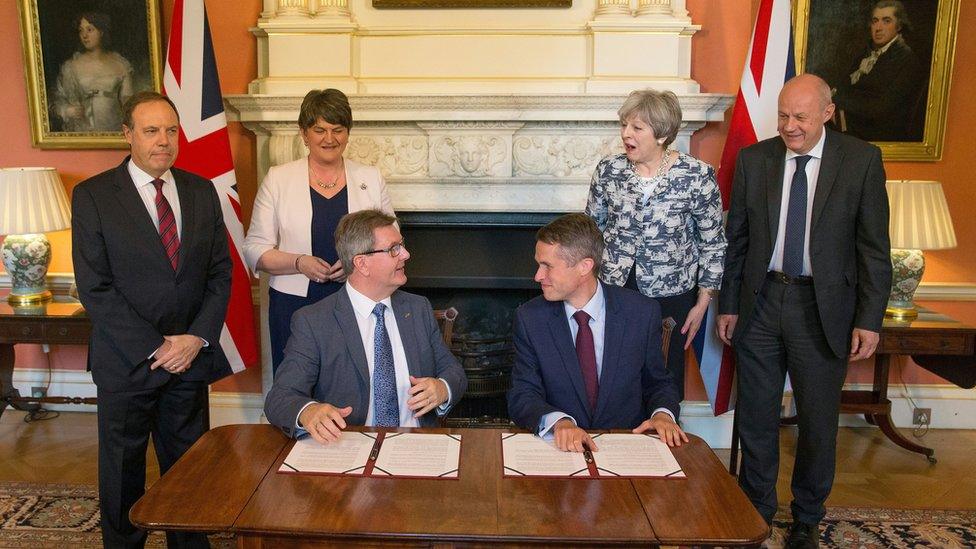
Jeffrey Donaldson was involved in negotiating the confidence-and-supply deal with the Conservative Party in 2017
However, when Boris Johnson entered Downing Street, the DUP's hope that he would deliver an agreement for unionists appeared misguided.
Sir Jeffrey and other DUP politicians spoke out against the Irish Sea border, but were unable to persuade the prime minister to scrap it.
They were accused of wasting their influence over the government, which then disappeared entirely once Boris Johnson won a snap general election in December 2019.
That election saw the Lagan Valley MP's own performance suffer too.
He has been elected to Westminster seven times, almost all of them with an overwhelming majority.
In 2019 it fell sharply, with Alliance's Sorcha Eastwood narrowing the gap from 20,000 votes to just over 6,000 - a result few saw coming and one Sir Jeffrey will not want to repeat.
The MP has said he wants to be first minister and will not lead remotely from Westminster, but he will need to be co-opted into the assembly.
The prospect of a close Westminster by-election is not one the DUP will relish right now.
The seasoned politician did not expect to be taking over from Edwin Poots so quickly after they competed against each other.
Control of the DUP will soon officially be Sir Jeffrey's, but there are massive challenges looming.
Can he reunite and reform the party, while convincing the electorate he is the right person to lead the DUP and show that his party has much to offer?
Related topics
- Published22 June 2021
